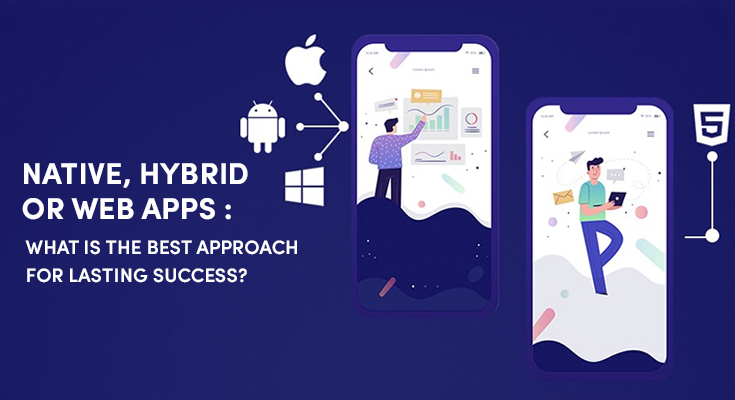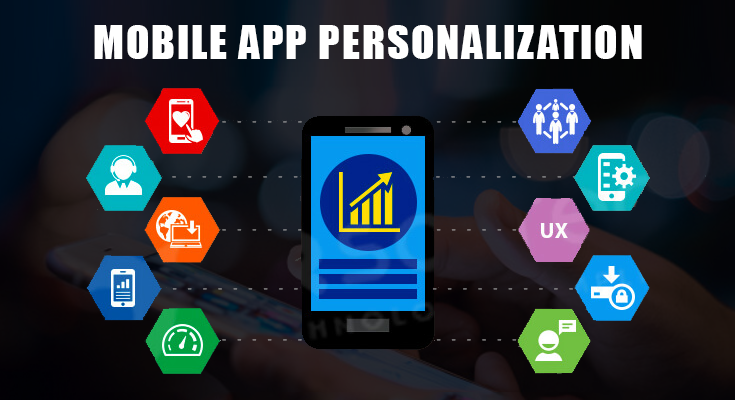Native, Hybrid or Web Apps : What is the Best Approach for Lasting Success?

Mobile Applications are truly a part of our life now. The extent of the mobile app’s impact is such that nobody can imagine a single day of life without them. And, this is one reason which makes it such a good method of earning good success and money today.
So, now you have cool app ideas in your mind, and you are all set to create your own mobile application. Wait, there is a ‘but’ here, you are confused about what is native, hybrid, and web apps?
But, most importantly the bugging question for you is which one of these is going to benefit you and your startup ideas in the long run, right?
Don’t worry yet, rather thank yourself for clicking in the right blog. This post is for you to take part in the long run debate between Native, Hybrid, and Web Apps.
What you can expect from this Blog for your Mobile Application Idea?
To be honest, every mobile app idea is different, your target audience is different and of course, due to the huge differences between the three, it can only be you deciding ‘the one for you’ based on what you need. Here, we will be taking you through all their pros and cons, and in the end, you can decide which one suits you and your budget the best.
And, your choice can easily depend on several factors such as –
1. Competitive factors
2. Budget
3. The time you have to reach the deadline
4. Level of user-friendliness
5. Speed and Delivery
What is Native App Development?
These are the most common types of common apps which are particularly made for platforms that include Android or even iOS. To develop Native Apps, developers are seen using programming languages such as which are specifically backboned by a certain platform on which the app is supposed to run. Native Apps are mostly for Android, Java, Kotlin, Swift, and Objective C.
What are the Perks of Using Native App Development?
We are going to list a few advantages which you may get by using Native App development for your idea.
1. With Native App development, you get the benefit of accessing a full feature set of the OS which you have selected.
2. The best part about using Native apps is that you get a base that is interactive, intuitive, and can even run seamlessly for higher inputs and outputs.
3. Complete support from common app stores which increases distribution in app stores and allows the best discoverability.
4. If compared to Web Apps and Hybrid apps, you obviously get better user experience. Wondering why? Well, this is because the user gets a more natural flow due to its specific UI guidelines.
5. A native app assures more security, quality, and better compatibility with the device.
What are the Disadvantages of Native Apps?
Here are some of the disadvantages of Native Apps which might change your mind-
1. Native apps usually need experienced developers.
2. It is more expensive in comparison to web apps and hybrid apps.
3. For simple applications native is not the perfect option for you.
4. Also, native apps are highly time-consuming.
5. It is demanding to update and maintain the app across the codebase.
What are Web Apps and Why use it?
1. The development cost is lower as compared to native and hybrid apps.
If an application is accessed with the help of a web browser over the internet then it is called a web app. These are mostly functional and also needs to be downloaded like mobile apps. The best part is that they do not consume much storage space.
What are the Advantages of using a Web App?
Moving on with more on web apps, let’s talk a little about its perks in this section
1. Web Apps are easy to maintain.
2. The development cost is lower as compared to native and hybrid apps.
3. It mainly has a single code base across different platforms.
4. A few of the things which can be released quickly in Web Apps are – deployment, distribution, and updates.
5. The features are accessible through JavaScript APIs
What are the Various Limitations of Web Apps?
Below we have listed a few cons of using Web Apps-
1. There is a lower level of responsiveness in comparison to other apps.
2. They are no availability of Web Apps in the ‘App Store’.
3. Many of the features such as – Home Screen, Work Offline, and Push notifications are not supported.
4. The UI design elements are mostly inconsistent.
5. Web apps are slow in operation.
What are Hybrid Apps and Why Use it?
You can consider hybrid apps as an amalgamation of both Native and Web apps. These apps are very easy to build on HTML, CSS, or even Javascript. One of the good parts of using Hybrid apps is that they can be created in a short period of time and that too with limited resources. Also, you can get them to launch and test the apps with feedback are quick.
Moreover, people can access hybrid apps easily on Google Play, App Store as well as Window Store. Sounds intriguing, right?
What are the Advantages of Using Hybrid Apps?
1. Creating these apps are highly cost-effective.
2. You can even work offline on hybrid apps
3. They serve their purposes on both Android and iOS.
4. Hybrid apps are based on single code and have a cross-platform support
5. You can update new things in an easier and faster way
What are the Disadvantages of using Hybrid Apps?
1. These apps are less responsive as they load in browsers
2. Mostly dependent on third-party platforms
3. Developers find hybrid app’s UX highly compromised.
So, Which App Guarantees you Lasting Success?
Each of the apps mentioned above has its own pros and cons. It is you who would choose which type of app you require at the moment for your idea.
But, in a comparison basis, we can see that Hybrid apps turn out to be a clear winner with higher advantages.
So, choose your app wisely based on your business objectives.
Here are some factors to keep in mind-
1. How functional and fast you need the app?
2. Level of complexity in features
3. How much does it cost to develop an app?
4. User experience level you want your app to have




